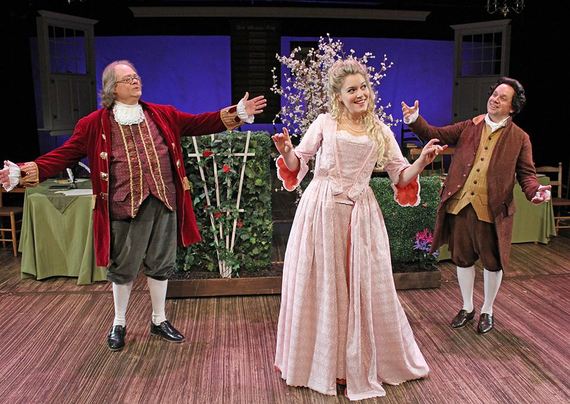
As we approach the celebration of America's 239th year of independence, Americans can learn about their revolutionary past from many sources, including an unexpected one: musical theatre.
The intersection between politics and musical theatre is small, indeed. One current anomaly is the hottest show in New York City, even though it does not open on Broadway until July 15. Hamilton, the creation of Lin-Manuel Miranda, opened to near-universal raves off-Broadway, and it relies on historian Ron Chernow's important biography of Alexander Hamilton.
Some 46 years ago, another musical set in the eighteenth century opened to acclaim, capturing the Tony Award for best musical. Set primarily in Philadelphia's Independence Hall, 1776 tells the story of the fateful weeks leading up to the writing and ratification of the Declaration of Independence by the Second Continental Congress. Given this thumbnail description, one might expect either a ponderous or puffed treatment of those tumultuous days.
Surprisingly, however, the show's enduring popularity (it was also made into a film in 1972 with most of the original stage cast, including the estimable William Daniels in the starring role of John Adams) attests to the skill and dexterity of its authors. Yes, historical figures depicted on stage burst into song from time to time, and while that art form may turn aside some, those who accept the conceit -- which is, after all, the conceit of all musical theatre -- find real meat on the historical bones of this show.
(Disclaimer: I am both a political scientist who has written some on the founding period, and currently have a small role in Central New York's Cortland Repertory Theatre company's production of 1776. Fittingly, its final performance is July 4.)
The play's representation of the central characters reflects their historical personas: for example, we learn at the outset that John Adams is "obnoxious and disliked," as indeed he was. Maryland's Samuel Chase was discourteously dubbed "bacon-face" by his congressional colleagues, owing to his girth and prodigious appetite. Rhode Island delegate Stephen Hopkins was a prodigious drinker, and so on.
Beyond this, however, the production includes extended discussions of the key issues at stake -- many of which continue to bedevil the country today. Commander-in-Chief George Washington's numerous gloomy dispatches about the abysmal condition of his military in the face of superior British forces were enough to "depress a hyena," as Delaware's Thomas McKean lamented. When Adams wails at the top of the show, "By God I have had this Congress!" it could just as easily be Barack Obama speaking in 2015.
During a scene when Declaration chief author Thomas Jefferson is defending the document to skeptical Pennsylvania delegate John Dickinson, who asserts that America lacks the right to rebel, Jefferson counters by citing British political thinker John Locke's contract theory of governance (whose writing profoundly influenced Jefferson): "When a king becomes a tyrant he thereby breaks the contract binding his subjects to him."
Income inequality and the privilege of wealth inflame passions when Dickinson defends the influence of wealthy elites in a nation of relative poverty. Congress's President John Hancock notes that the body's conservatives are unlikely to marshal much support in the country because "there are not enough men of property in America to dictate policy." "Perhaps not," Dickinson retorts, "but don't forget that most men with nothing would rather protect the possibility of becoming rich than face the reality of being poor. And that is why they will follow us." Koch brothers, anyone?
States' rights and the relative balance of state versus national power sparks an exchange between delegates when South Carolina's Edward Rutledge asks John Adams what the goal is beyond achieving independence. "We intend to become one nation," Adams replies, to which Rutledge expresses his preference for "a nation of sovereign states, united for our mutual protection, but separate for our individual pursuits." Preference for a weak national government finds expression in the nation's first constitution, the Articles of Confederation (1777). Yet that document's manifest weaknesses lead to its eclipse by the document of 1787, that far exceeded Rutledge's call for a limited national government. Last week's historic Supreme Court rulings on the Affordable Care Act and same sex marriage are but the most recent examples of the continuing struggle over federal versus state power.
Most centrally, the debate over the Declaration's wording leads to the climactic moment in the show when the southern delegates walk out in protest of wording in the document condemning slavery. That near-rupture was staved off by the wording's excision. Obviously, slavery would continue to cast its shadow over the country until the bloody Civil War finally ended the practice. As we know today, of course, it hardly ended the pall of fractured race relations which continue to rile our politics.
Finally, musical theatre is a distinctly American phenomenon. The mix of drama, historical text, humor and stirring music in 1776 gives a life to our past in a way that the likes of Ben Franklin might have appreciated, if not enjoyed.
